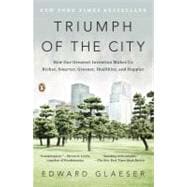
Note: Supplemental materials are not guaranteed with Rental or Used book purchases.
Purchase Benefits
What is included with this book?
| Introduction: Our Urban Species | p. 1 |
| What Do They Make in Bangalore? | p. 17 |
| Ports of Intellectual Entry: Athens | p. 19 |
| Baghdad's House of Wisdom | p. 21 |
| Learning in Nagasaki | p. 23 |
| How Bangalore Became a Boom Town | p. 24 |
| Education and Urban Success | p. 27 |
| The Rise of Silicon Valley | p. 29 |
| The Cities of Tomorrow | p. 34 |
| Why Do Cities Decline? | p. 41 |
| How the Rust Belt Rose | p. 43 |
| Detroit Before Cars | p. 46 |
| Henry Ford and Industrial Detroit | p. 49 |
| Why Riot? | p. 52 |
| Urban Reinvention: New York Since 1970 | p. 56 |
| The Righteous Rage of Coleman Young | p. 58 |
| The Curley Effect | p. 60 |
| The Edifice Complex | p. 61 |
| Remaining in the Rust Belt | p. 63 |
| Shrinking to Greatness | p. 64 |
| What's Good About Slums? | p. 69 |
| Rio's Favelas | p. 72 |
| Moving On Up | p. 76 |
| Richard Wright's Urban Exodus | p. 79 |
| Rise and Fall of the American Ghetto | p. 81 |
| The Inner City | p. 85 |
| How Policy Magnifies Poverty | p. 86 |
| How Were the Tenements Tamed? | p. 93 |
| The Plight of Kinshasa | p. 95 |
| Healing Sick Cities | p. 97 |
| Street Cleaning and Corruption | p. 101 |
| More Roads, Less Traffic? | p. 104 |
| Making Cities Safer | p. 106 |
| Health Benefits | p. 114 |
| Is London a Luxury Resort? | p. 117 |
| Scale Economies and the Globe Theatre | p. 119 |
| The Division of Labor and Lamb Vindaloo | p. 122 |
| Shoes and the City | p. 126 |
| London as Marriage Market | p. 127 |
| When Are High Wages Bad? | p. 129 |
| What's So Great About Skyscrapers? | p. 135 |
| Inventing the Skyscraper | p. 136 |
| The Soaring Ambition of A. E. Lefcourt | p. 140 |
| Regulating New York | p. 142 |
| Fear of Heights | p. 144 |
| The Perils of Preservation | p. 148 |
| Rethinking Paris | p. 152 |
| Mismanagement in Mumbai | p. 157 |
| Three Simple Rules | p. 161 |
| Why Has Sprawl Spread? | p. 165 |
| Sprawl Before Cars | p. 167 |
| William Levitt and Mass-Produced Housing | p. 174 |
| Rebuilding America Around the Car | p. 177 |
| Welcome to The Woodlands | p. 180 |
| Accounting for Tastes: Why a Million People Moved to Houston | p. 183 |
| Why Is Housing So Cheap in the Sunbelt? | p. 188 |
| What's Wrong with Sprawl? | p. 193 |
| Is There Anything Greener Than Blacktop? | p. 199 |
| The Dream of Garden Living | p. 202 |
| Dirty Footprints: Comparing Carbon Emissions | p. 206 |
| The Unintended Consequences of Environmentalism | p. 210 |
| Two Green Visions: The Prince and the Mayor | p. 213 |
| The Biggest Battle: Greening India and China | p. 217 |
| Seeking Smarter Environmentalism | p. 220 |
| How Do Cities Succeed? | p. 223 |
| The Imperial City: Tokyo | p. 224 |
| The Well-Managed City: Singapore and Gaborone | p. 227 |
| The Smart City: Boston, Minneapolis, and Milan | p. 231 |
| The Consumer City: Vancouver | p. 238 |
| The Growing City: Chicago and Atlanta | p. 241 |
| Too Much of a Good Thing in Dubai | p. 244 |
| CONCLUSION: Flat World, Tall City | p. 247 |
| Give Cities a Level Playing Field | p. 249 |
| Urbanization Through Globalization | p. 251 |
| Lend a Hand to Human Capital | p. 253 |
| Help Poor People, Not Poor Places | p. 255 |
| The Challenge of Urban Poverty | p. 257 |
| The Rise of the Consumer City | p. 259 |
| The Curse of NIMBYism | p. 260 |
| The Bias Toward Sprawl | p. 264 |
| Green Cities | p. 276 |
| Gifts of the City | p. 268 |
| Acknowledgments | p. 271 |
| Notes | p. 275 |
| Bibliography | p. 307 |
| Index | p. 325 |
| Table of Contents provided by Ingram. All Rights Reserved. |
The New copy of this book will include any supplemental materials advertised. Please check the title of the book to determine if it should include any access cards, study guides, lab manuals, CDs, etc.
The Used, Rental and eBook copies of this book are not guaranteed to include any supplemental materials. Typically, only the book itself is included. This is true even if the title states it includes any access cards, study guides, lab manuals, CDs, etc.